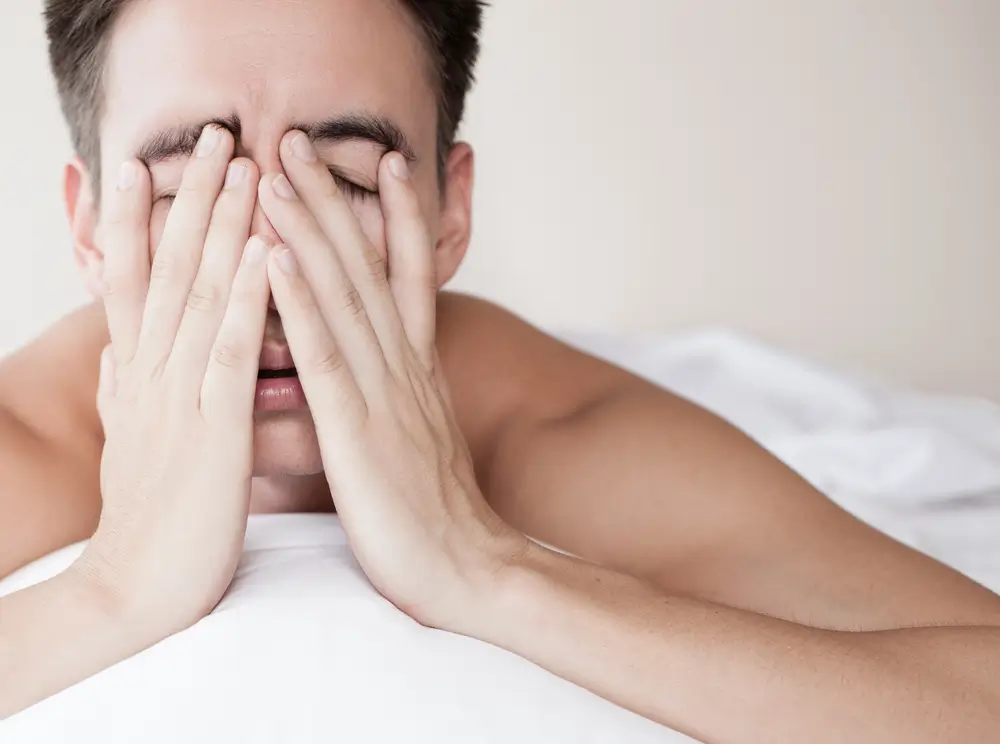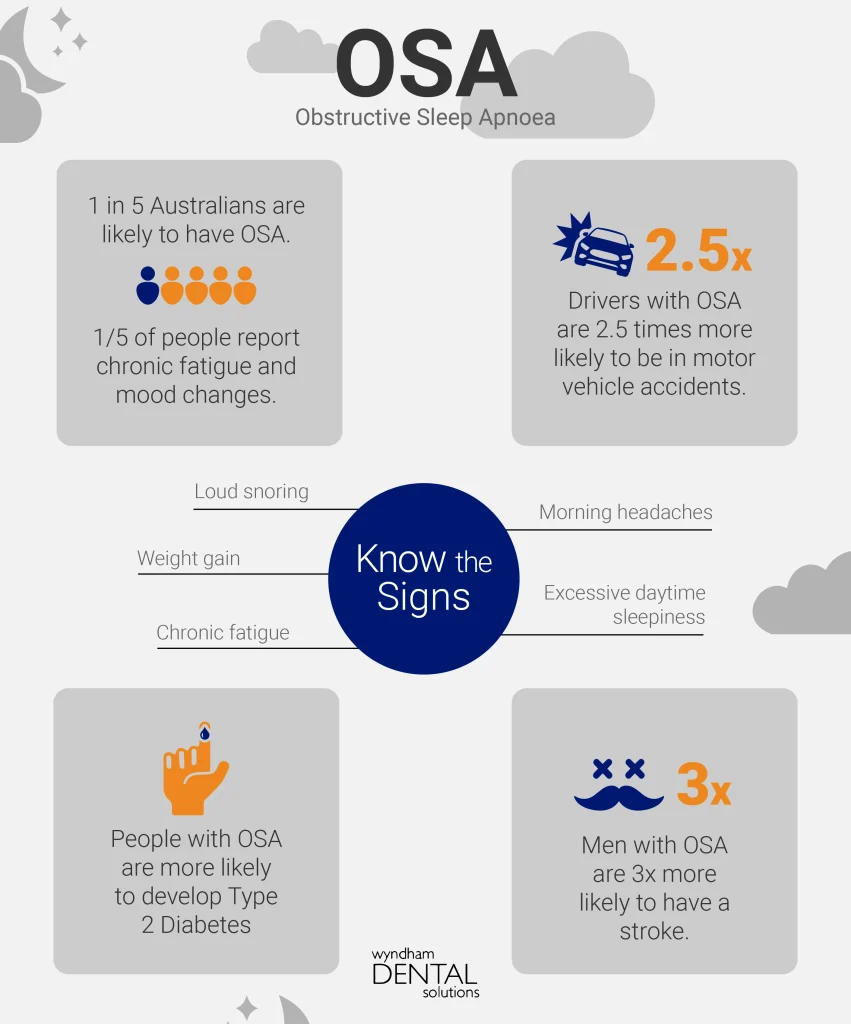Can Sleep Apnoea Snoring Be Cured?

There’s nothing quite like a good night’s sleep at the end of a long day. It’s like hitting the reset button, giving your body and mind a chance to rest and reset for the next day.
However, if you find yourself waking up tired and feeling like you’re not fully rested, it could be a sign of a sleep disorder. One of the most common sleep disorders is Obstructive Sleep Apnoea (OSA), which when left untreated can disrupt your sleep, health and life.
At Wyndham Dental, we provide sleep apnoea treatment for our patients so that you can get a good night’s sleep.
What is Sleep Apnoea?
Sleep apnoea (also known as Obstructive Sleep Apnoea) is a sleep disorder that can disrupt your breathing as you sleep. With this condition, you may stop breathing for 10 seconds or more, and it can happen multiple times overnight.
Also called episodes or interruptions, these obstructions can be partial or complete and can vary depending on the severity of your condition. In milder cases of sleep apnoea, individuals may experience between 5-15 interruptions per hour, while moderate cases typically see around 15-30 interruptions. Severe cases of sleep apnoea may result in more than 30 interruptions.
This condition occurs when your throat muscles are overly relaxed, leading the walls of your throat to become narrow. So, as you breathe, the air travelling through the narrowed airways can cause vibrations in the tissue at the back of your throat, resulting in the all too familiar sound of snoring.
Causes of Sleep Apnoea Snoring
- Obesity and being overweight can make the throat narrower because of excessive tissue/fat around the neck.
- Ageing: as you age your throat muscles can relax more during sleep.
- Medication (such as sleeping tablets and sedatives) and alcohol can make your muscles relax more than usual.
- Smoking can cause inflammation in the airways and irritate nasal passages.
- Allergies can cause your nasal passages to swell.
- Certain health conditions such as hypothyroidism and large goitres.
What are the Symptoms of Sleep Apnoea?
The thing about OSA is that you may not be aware of it. However, there may be warning signs that include:
- Poor quality of sleep
- Sleepiness or fatigue during the day
- Headaches upon waking
- Loud or frequent snoring
- Mood changes
- Dry mouth in the morning
- Poor memory, concentration and reaction times
- Decreased libido and male impotence
- Anxiety and depression
If you’re wondering how to address sleep apnoea, scheduling an appointment with one of our dentists is the best place to start. We will then refer you to a sleep study, which is the best way to diagnose sleep apnoea.
A sleep study is a medical test that monitors factors such as brain signals, oxygen levels in your blood, limb movements, sleep position, heart rate and snoring to diagnose OSA and its underlying cause and severity.
You can either undertake a sleep study in the comfort of your home or at a specialised sleep clinic – the choice is yours. Once the condition and its severity have been diagnosed, we will draw up a personalised treatment plan for you.

How to Treat Sleep Apnoea Snoring?
While sleep apnoea treatment varies from person to person, it can include one or more of the following options:
Weight Loss
If you are overweight or obese, losing weight can make a difference. While it may not put a stop to sleep apnoea snoring entirely, it can reduce the severity of the condition. In addition, losing weight also provides other health benefits.
Cut Down Your Alcohol Intake
Did you know that the glass of alcohol you had at night can make your snoring worse? While quitting alcohol consumption is the best solution, it may be hard to give up on it altogether immediately. To manage sleep apnoea snoring, you can take steps to drink in moderation and at least 4 to 5 hours before bedtime.
Change Your Sleeping Position
One of the simpler ways to treat sleep apnoea is by changing your sleep position. If you have sleep apnoea, sleeping on your back is not recommended because the effects of gravity can cause your jaw, tongue and soft palate to drop back towards the throat, narrowing your airways. Instead, we suggest sleeping on your stomach or your side. However, sleeping on your stomach may cause neck pain, so sleeping on your side may be a better solution to manage OSA.
Wear a Continuous Positive Airway Pressure (CPAP) Mask
CPAP is one of the most common and effective treatments for sleep apnoea. This treatment involves wearing a mask connected to your nose and/or mouth, which uses a small pump to blow air into the mask through tubing. Wearing this mask can increase the air pressure in your throat to hold it open and prevent the throat from collapsing.
At Wyndham Dental, we will help you find the right CPAP mask to help control OSA and snoring to ensure your comfort.
Oral Appliances
For mild to moderate cases of sleep apnoea, oral appliances such as a Mandibular Advancement Splint (MAS) or a Tongue Stabilising Device can help. The Mandibular Advancement Splint works by pushing your lower jaw forward to open up the airway and prevent snoring or obstructions. On the other hand, the Tongue Stabilising Device works by holding the tongue forward to prevent it from sliding down your throat and keeping the airway open.
Surgery
If you have severe sleep apnoea snoring or if other sleep apnoea treatments have failed, surgery may be your last resort. This treatment may involve upper airway or jaw surgery, or surgery to remove tonsils.
Sleep apnoea, left untreated, can have drastic effects on your health and life. For instance, it can cause health problems such as high blood pressure and diabetes. Not to mention, it can also affect your driving ability, impair cognitive functioning and affect your relationships with your partner or family.
So, if you think you have sleep apnea and can’t remember the last time you got a good night’s sleep, contact our friendly team at Wyndham Dental. We will assess your condition, diagnose OSA and develop a treatment plan to manage your condition.
So, don’t let the snores go unnoticed and give us a call today!
